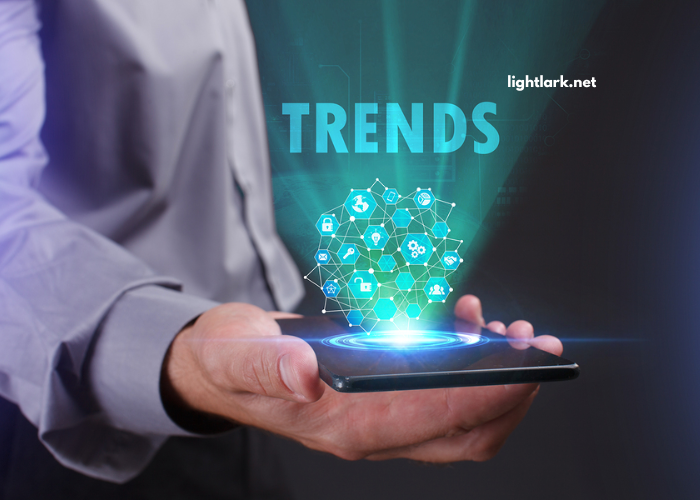In the ever-evolving landscape of business, staying ahead of the curve is paramount for entrepreneurs looking to thrive in an increasingly competitive market. As we approach 2025, new trends and technological advancements are set to redefine how businesses operate, engage with customers, and manage internal operations. Understanding these trends is essential for any entrepreneur aiming to succeed in the next few years. This article explores the key business trends in 2025, offering actionable insights to help entrepreneurs stay ahead of the competition.
The Rise of Artificial Intelligence (AI) and Automation
AI-Powered Solutions Revolutionize Business Operations
Artificial intelligence (AI) has already begun to reshape numerous industries, and by 2025, its influence will be even more pronounced. From automating routine tasks to enhancing customer experiences, AI-powered solutions will become critical to business operations. Entrepreneurs will leverage AI in various aspects, including customer service, marketing, inventory management, and predictive analytics.
For instance, AI-driven chatbots are already revolutionizing customer service by providing instant responses to customer inquiries 24/7. In 2025, these chatbots will become even more sophisticated, able to handle complex customer interactions and improve overall satisfaction. Entrepreneurs should look for AI solutions that can streamline operations, reduce costs, and improve customer engagement.
Automation in Manufacturing and Logistics
Automation in manufacturing and logistics is expected to accelerate in 2025, with robots, drones, and autonomous vehicles playing an increasingly vital role. Entrepreneurs in industries such as e-commerce, manufacturing, and distribution will benefit from adopting automation to improve efficiency, reduce human error, and cut costs. The integration of AI and automation will also lead to smarter supply chains, with real-time tracking and predictive maintenance becoming the norm.
Personalization through AI
Another critical area where AI will play a significant role is in personalized marketing and customer engagement. By 2025, businesses will have access to more advanced AI tools capable of analyzing customer data in real-time. These tools will allow entrepreneurs to create highly personalized experiences for their customers, which is a key factor in building brand loyalty and increasing sales.
The Growth of Remote Work and Hybrid Work Models
The Shift to Remote and Hybrid Work
The COVID-19 pandemic accelerated the shift toward remote work, and this trend is expected to continue into 2025. However, the future of work will likely see a rise in hybrid models, where employees split their time between working remotely and in-office. Entrepreneurs will need to adapt their business strategies to accommodate this new way of working.
One of the major advantages of remote and hybrid work models is access to a global talent pool. Entrepreneurs will no longer be restricted to hiring locally and will be able to tap into skilled workers from around the world. This trend will also enable businesses to reduce overhead costs related to office space and utilities.
Technology-Driven Collaboration Tools
To support remote and hybrid work, businesses will increasingly rely on advanced collaboration tools such as cloud-based project management software, video conferencing, and virtual office platforms. Entrepreneurs should invest in these technologies to ensure smooth communication and collaboration among remote teams. The right technology stack will be critical to maintaining productivity and efficiency in a decentralized work environment.
Sustainability and Green Business Practices
The Growing Demand for Sustainable Products and Services
As environmental concerns continue to rise, sustainability is becoming a central focus for both consumers and businesses. By 2025, the demand for sustainable products and services will increase significantly, driven by consumer preferences for eco-friendly options. Entrepreneurs who prioritize sustainability in their business models will be better positioned to attract environmentally-conscious consumers.
Whether through reducing carbon footprints, adopting circular economy principles, or sourcing raw materials responsibly, businesses will need to integrate sustainability into their operations. Entrepreneurs can capitalize on this trend by developing products and services that cater to the growing demand for eco-friendly options.
Green Technology and Innovation
In addition to sustainable products, green technology will play a significant role in business innovation in 2025. Renewable energy solutions, energy-efficient products, and waste reduction technologies will become more accessible and affordable. Entrepreneurs in industries such as energy, construction, and manufacturing should explore these innovations to not only contribute to environmental protection but also reduce operational costs in the long term.
E-Commerce and Digital Transformation
The Continued Growth of E-Commerce
E-commerce has been steadily growing over the past decade, and by 2025, it is expected to continue its upward trajectory. Entrepreneurs will increasingly rely on online platforms to reach customers, sell products, and provide services. However, the e-commerce landscape will become more competitive, with an emphasis on personalized experiences and seamless transactions.
Entrepreneurs should focus on developing user-friendly websites, optimizing mobile shopping experiences, and integrating advanced payment solutions. Additionally, expanding e-commerce operations into international markets will present new growth opportunities for businesses.
The Role of Augmented Reality (AR) and Virtual Reality (VR)
As technology advances, augmented reality (AR) and virtual reality (VR) will revolutionize the way customers interact with products and services. By 2025, entrepreneurs in sectors like retail, real estate, and entertainment will use AR and VR to offer immersive shopping experiences and virtual product demonstrations.
For example, AR can allow customers to visualize how a piece of furniture will look in their home, while VR can provide virtual tours of real estate properties. Entrepreneurs should invest in these technologies to enhance customer engagement and differentiate their brands in a crowded market.
Blockchain and Cryptocurrency
Blockchain for Secure Transactions
Blockchain technology, which underpins cryptocurrencies like Bitcoin, is poised to transform business operations in 2025. Its decentralized and transparent nature makes it ideal for secure transactions, supply chain management, and data verification. Entrepreneurs should consider integrating blockchain into their operations to enhance security, reduce fraud, and improve efficiency.
In addition to its use in financial transactions, blockchain will be increasingly applied to industries such as logistics, healthcare, and manufacturing, where tracking and verification of data are critical.
Cryptocurrency Adoption in Business
Cryptocurrency is also expected to become more mainstream by 2025. While still in its early stages, many businesses are already beginning to accept digital currencies as a form of payment. As the regulatory landscape for cryptocurrencies evolves, entrepreneurs should consider whether integrating cryptocurrency payments into their business model is viable.
The Importance of Data-Driven Decision Making
Big Data and Analytics
Data will continue to be a driving force in business decisions throughout 2025. Entrepreneurs will increasingly rely on big data analytics to make informed choices about everything from product development to marketing strategies. By gathering and analyzing customer behavior data, businesses can gain insights into preferences, trends, and pain points, enabling them to create more targeted products and campaigns.
With advancements in machine learning and AI, the ability to process and analyze vast amounts of data will become even more powerful. Entrepreneurs should invest in data analytics tools and develop a data-driven mindset to make smarter, more strategic decisions.
Predictive Analytics for Business Growth
Predictive analytics will allow entrepreneurs to forecast future trends, customer behaviors, and market conditions. By leveraging machine learning algorithms, businesses will be able to anticipate changes in the market and adjust their strategies accordingly. Predictive analytics can also improve customer retention by identifying at-risk customers and offering timely interventions.
Health and Wellness Industry Boom
The Growth of Health and Wellness Trends
As consumers become more health-conscious, the health and wellness industry is set to experience significant growth in 2025. Entrepreneurs who tap into this market will benefit from the rising demand for fitness products, mental health services, organic foods, and alternative wellness therapies. In particular, the demand for wellness apps, fitness equipment, and personalized health solutions will be on the rise.
Entrepreneurs should focus on integrating technology into the wellness space, such as developing health-tracking apps, offering virtual fitness coaching, or creating wellness-focused e-commerce platforms.
Conclusion
The business world in 2025 will be shaped by technological advancements, sustainability efforts, and changing consumer expectations. Entrepreneurs who stay ahead of these trends and adapt their strategies accordingly will be well-positioned for success. From AI and automation to remote work and green business practices, the opportunities for innovation are vast. By embracing these trends, entrepreneurs can not only survive but thrive in the competitive landscape of 2025.
As the business environment continues to evolve, it’s essential for entrepreneurs to remain agile, continuously learn about new technologies, and keep a pulse on shifting consumer preferences. By doing so, they can ensure that their businesses remain competitive, sustainable, and future-ready.





